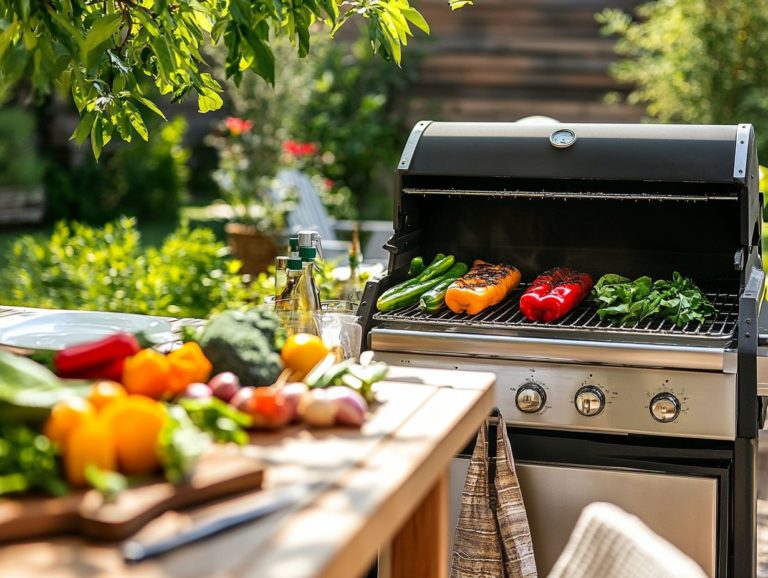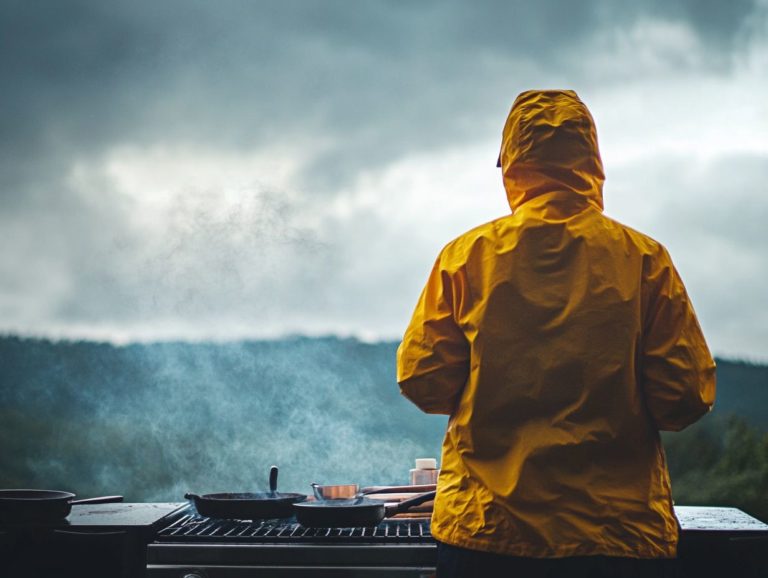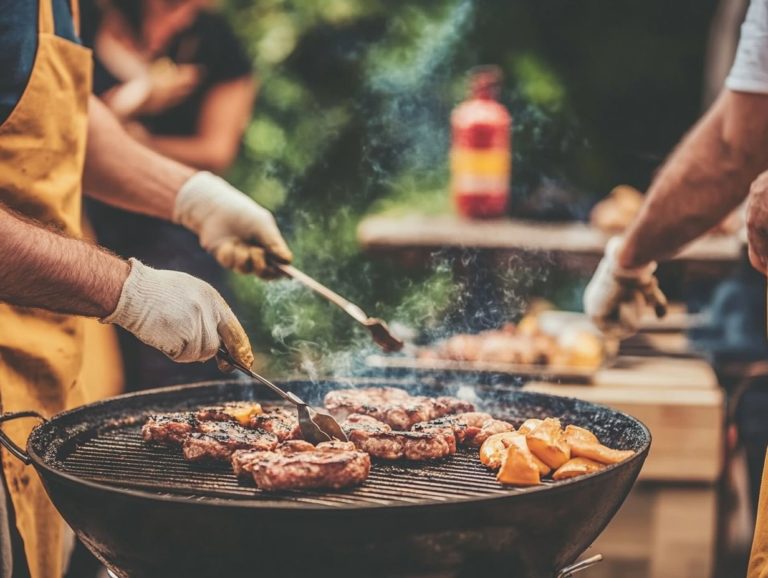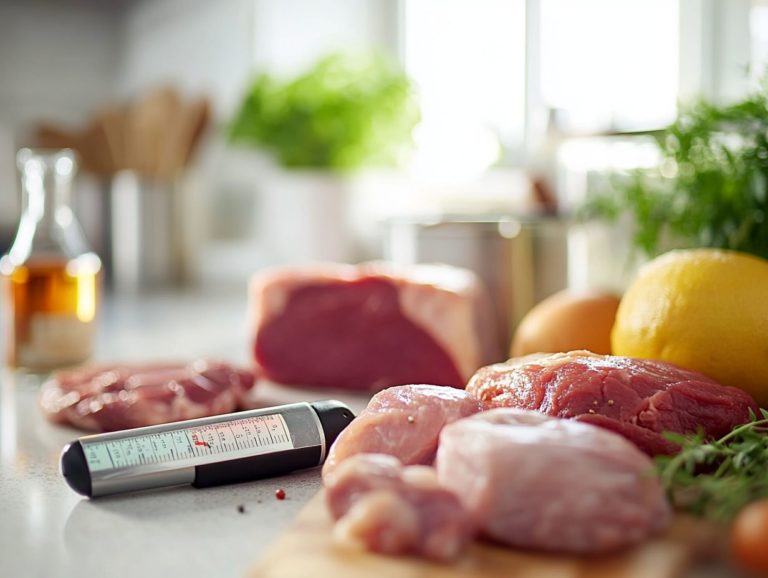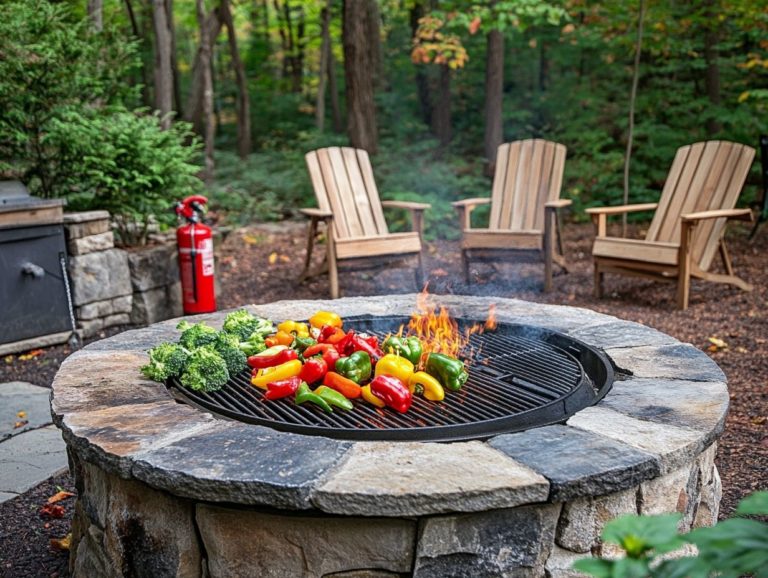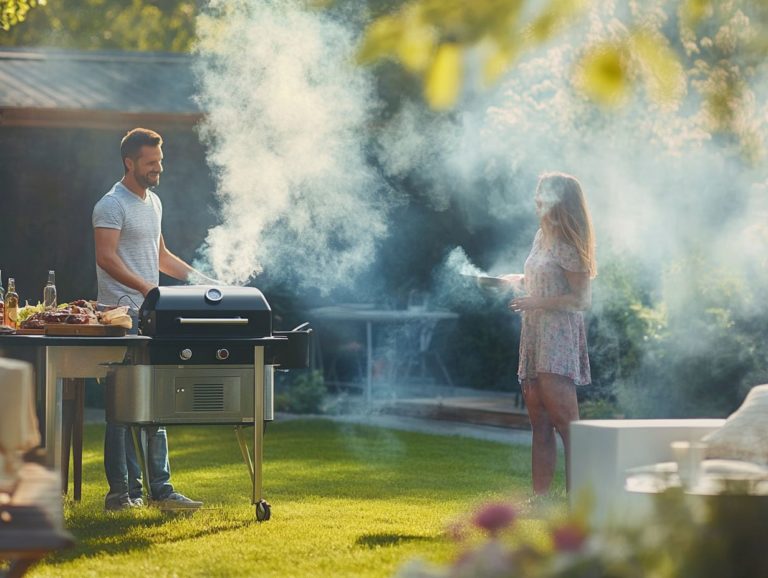Safety Tips for Cooking with Alcohol Outdoors
Let s ignite your outdoor cooking adventure! Cooking outdoors can transform into a delightful experience, especially when you incorporate alcohol into your recipes, utilizing the right cooking equipment and techniques.
Alcohol not only enhances flavors but also elevates your cooking in remarkable ways. This article delves into various types of alcohol perfect for outdoor cooking and important food safety precautions to consider when selecting the right one.
You ll find essential safety precautions, including fire safety rules, to minimize risks, alongside tips and techniques for successful cooking. Plus, there are non-alcoholic alternatives for those who prefer to skip the spirits.
Contents
Key Takeaways:

- Choose the right type of alcohol based on alcohol content, flavor, and the cooking gear you re using.
- Take necessary safety precautions while cooking with alcohol outdoors to prevent accidents.
- Explore tasty ways to incorporate alcohol into outdoor cooking, such as using it as a marinade or in sauces.
Why Use Alcohol in Outdoor Cooking?
Incorporating alcohol into your outdoor cooking can elevate flavors, refine your techniques, and create a memorable culinary experience, especially in a well-ventilated outdoor kitchen. However, it’s important to follow top outdoor cooking safety tips for beginners when you’re firing up a charcoal grill, a propane grill, or a fire pit, as adding alcohol can transform not just your meals but the entire cooking journey.
However, it’s essential to understand the implications of using alcohol, particularly in relation to sickness caused by contaminated food and safety equipment. Prioritizing safety is crucial, especially in well-ventilated areas where fire hazards can pose significant risks. Following the top 10 safety tips for outdoor cooking equipment can ensure that you are mindful of food safety rules, allowing you to fully enjoy the art of outdoor cooking while keeping your adventures safe and delightful.
Choosing the Right Alcohol for Cooking
Choosing the right alcohol involves several key factors crucial for flavor enhancement and food safety. It s important to familiarize yourself with various types of alcohol whether it s wine, beer, or spirits and understand how each influences food safety and affects the risk of food poisoning.
Making the right selection is essential for ensuring a delightful outdoor cooking experience.
Factors to Consider
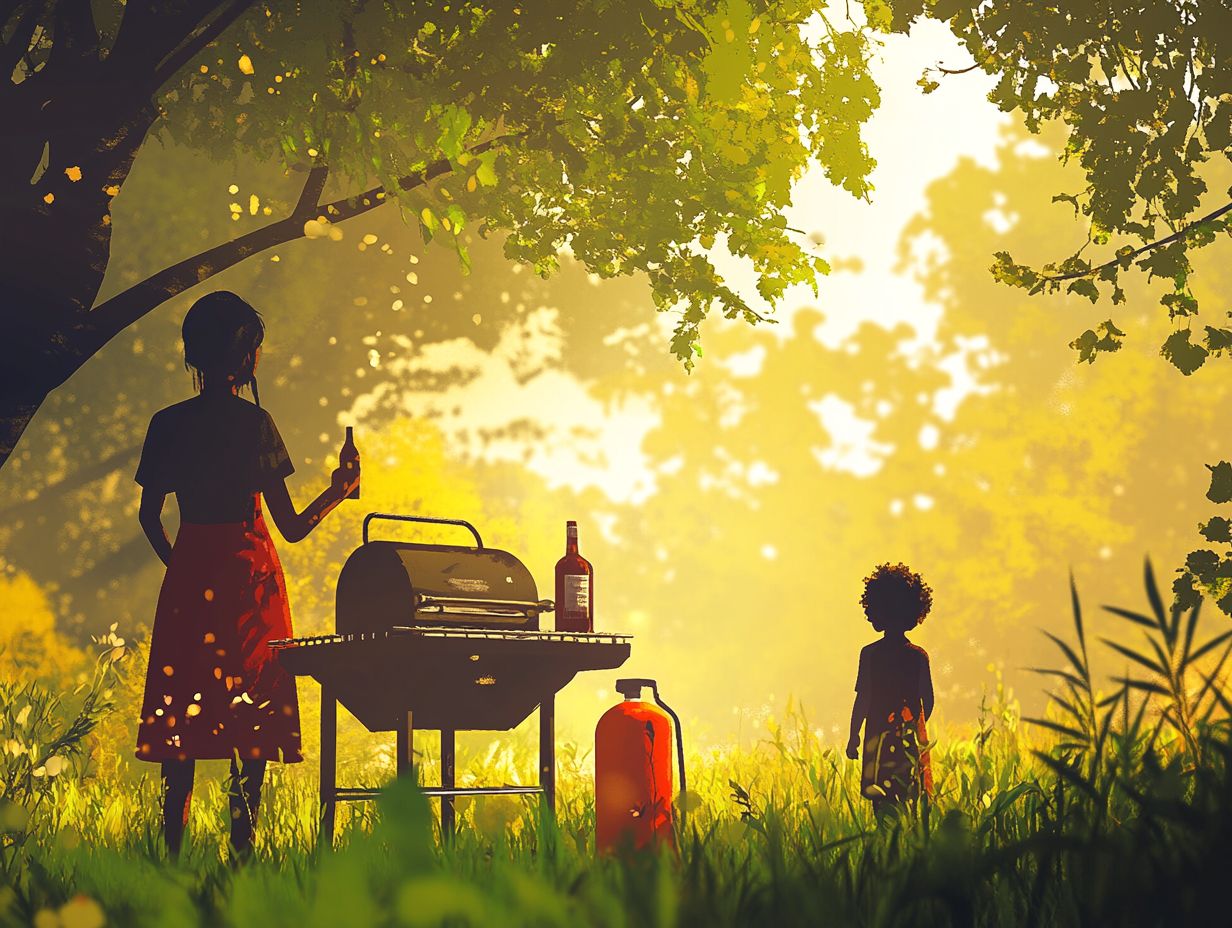
When selecting alcohol for outdoor cooking, consider:
- The type of cooking gear you re using.
- The nature of the food you re preparing.
- The importance of proper food storage to prevent foodborne illness, especially with perishable foods.
Understanding these elements enhances your culinary skills and ensures a safe and enjoyable cooking experience.
Choosing the right alcohol is about compatibility with your outdoor cooking equipment, whether it s a sleek portable grill, a trusty camp stove, or a classic fire pit. The food items you re cooking should complement the selected alcohol; for example, pairing certain beers or wines can elevate the flavors of marinated meats or vegetables, enhancing your foodie experience.
Adhering to food storage protocols is non-negotiable, especially with raw foods. Ensuring the right temperature can significantly reduce the risk of contamination. By prioritizing these essential factors, including safe handling of food storage, you can craft delicious meals outdoors while safeguarding against foodborne illnesses.
Are you ready to try incorporating alcohol into your outdoor cooking? Let s get started!
Safety Precautions to Take
When you embark on outdoor cooking adventures involving alcohol, it’s essential to prioritize safety tips for cooking with open flames outdoors. This helps minimize risks and avert accidents related to fire safety and maintaining a clean cooking area.
By using the right safety equipment and following fire regulations, you can enhance the safety of your outdoor cooking. Ensure you have a stable surface for your tools, making your cooking enjoyable and delicious while safeguarding your well-being according to U.S. Forest Service guidelines.
Minimizing Risks and Preventing Accidents
To minimize risks during outdoor cooking with alcohol, adhere to important food safety tips. Be sure to stay safe with essential tips for outdoor cooking like using ice packs to keep hot foods separate from cold foods and following expert cooking advice. Being mindful of potential hazards and ensuring safe handling of all ingredients will help you enjoy a worry-free cooking experience.
Incorporate key strategies like proper food handling and storage techniques with insulated containers. Keep food at safe temperatures to avoid the unsafe temperature range. Always separate raw foods from cooked items and thoroughly wash your hands before and after food preparation.
Maintaining a clean cooking area is vital for reducing the likelihood of food contamination. While focusing on hygiene, don t overlook fire safety. Always keep a bucket of water or a fire extinguisher handy your safety depends on it! Never leave a hot grill or any cooking setup unattended.
These steps will protect your culinary adventures and make them even more enjoyable, allowing you to create delicious meals for your backyard cookouts and camping trips.
Tips for Cooking with Alcohol Outdoors
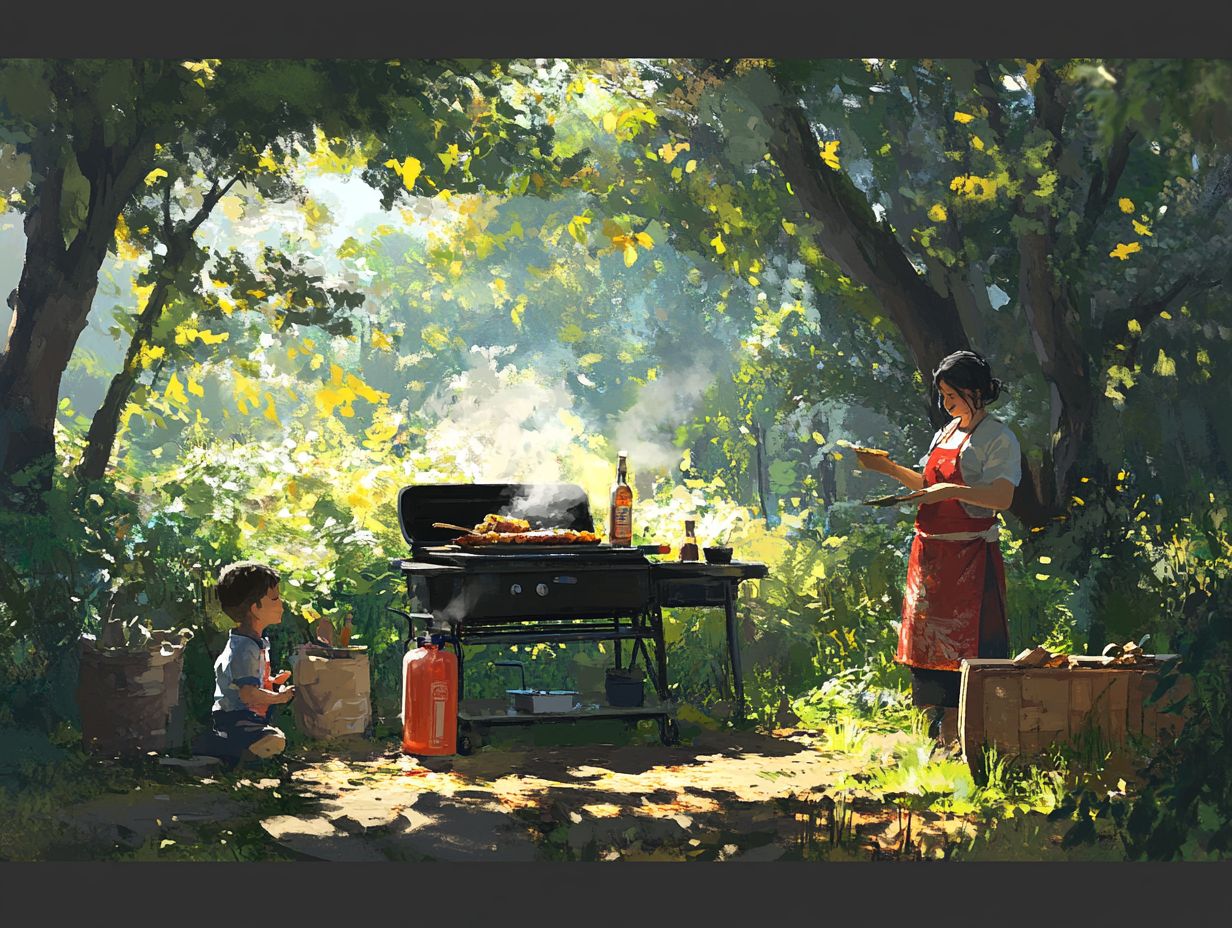
Cooking with alcohol outdoors can turn your meals into a delightful experience. Pairing the right techniques with quality tools and sound cooking advice, including safety tips for open flame cooking, elevates your culinary skills and crafts unforgettable moments in outdoor settings ideal for backyard cookouts, camping food, and cooking adventures.
Techniques and Recipes
Various cooking techniques can enhance your outdoor cooking experience with alcohol. Choose from a charcoal grill, a propane grill, or even a portable fire for your cooking pot. However, it’s important to be aware of the dangers of cooking outdoors without supervision. From marinades to reductions, many recipes can showcase how alcohol elevates your meals.
Consider using wine or beer in marinades; they not only tenderize meats but also infuse rich flavors. For example, marinating chicken in white wine with garlic and herbs yields a juicy and aromatic result. Beer can add unique depth to grilled ribs, enhancing your culinary skills.
When grilling, using indirect heat on a charcoal grill allows for slow cooking. This method is perfect for infusing smoky nuances from a splash of whiskey in your barbecue sauce. Don t miss the chance to create reductions with leftover cooking liquids, drizzling them over dishes for extra flavor.
Embrace the creative process! Let the rich aromatic qualities of alcohol inspire your outdoor culinary adventures while practicing safe food handling.
Alternatives to Cooking with Alcohol
If you choose to forgo alcohol in your outdoor cooking, a world of non-alcoholic substitutes is available. To ensure a safe cooking experience, it’s important to follow best practices for outdoor cooking safety. These options can elevate your culinary creations while maintaining food safety.
By mastering these alternatives, you can enjoy a rich cooking experience that preserves flavor and adheres to food safety standards, reducing the risk of foodborne illness.
Non-Alcoholic Substitutes and Recipes
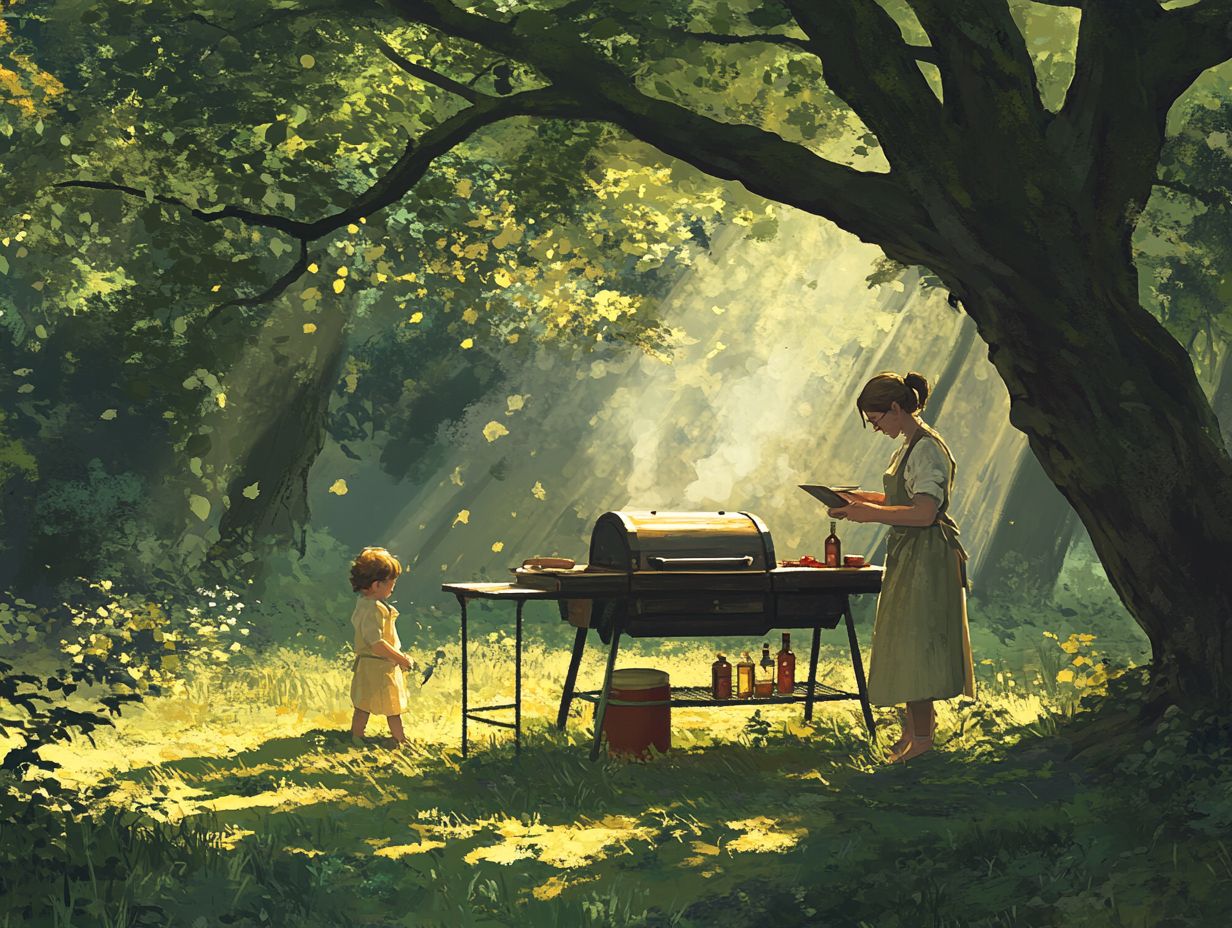
Utilizing non-alcoholic substitutes in your outdoor cooking can make your meals memorable while ensuring both safety and enjoyment. However, it’s important to be prepared for any mishaps. Knowing what to do in case of an outdoor cooking accident can help keep your experience safe. From flavorful vinegars to rich fruit juices, these alternatives replicate the depth of flavor that alcohol typically offers minus the associated risks of alcohol vapour.
For instance, you can substitute white wine with a splash of lemon juice or apple cider vinegar; these additions brighten your dishes and elevate their natural flavors, complementing your outdoor cooking gear. You can also use grape juice instead of red wine, introducing a delightful hint of sweetness that s perfect for marinades or braising, enhancing the flavor of your camping food.
When preparing these culinary delights outdoors, it’s essential to maintain strict food safety practices with clean water and proper food storage. Keep raw ingredients separate from cooked foods, and utilize containers that keep food hot or cold to effectively manage temperature and avoid the danger zone.
When you use these substitutes wisely, you’ll create delicious and safe meals that are sure to impress your family and friends. Following these food safety tips will help you cook with confidence!
Frequently Asked Questions
What are some safety tips for cooking with alcohol outdoors?
- Always use a cooking stove or grill specifically designed for outdoor use, ensuring it has a sturdy design for safety.
- Keep a fire extinguisher or bucket of water nearby in case of any accidents, especially when working with charcoal or propane.
- Never leave the cooking area unattended while alcohol is being used; always ensure you have safe handling practices in place.
- Use caution when using high-proof alcohol, as it can easily ignite and cause serious burns, particularly in well-ventilated areas.
- Avoid pouring alcohol directly onto the flame, such as when using a charcoal grill or any cooking pot, as this can cause a dangerous flare-up.
- Make sure to properly dispose of any used alcohol containers to prevent fire hazards and ensure food safety.

